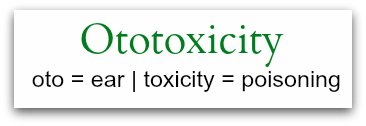The Sound of Silence: Kids and Ototoxicity
A 2008 Reader’s Digest article titled “Light in the Dark” introduced the world to triplets Sophie, Emma and Zoe Hooker, who were then seven years old. The triplets were born prematurely at 24 weeks, and a potentially fatal infection caused physicians in their neonatal unit to administer several different antibiotics. Unfortunately, the medications were ototoxic, meaning that they caused damage to the girls’ inner ears.

Sophie, Emma and Zoe were all deaf before they were two years old. Their mother, Liz, agreed to cochlear implants for the girls, but the implants had minimal effect. Because of their hearing loss and an additional condition that has left them blind, all three girls have significant developmental delays. Ototoxic antibiotics probably saved their lives, but they also left the children with severe disabilities. So when does the risk of ototoxic medication outweigh the reward?
Kids and Ototoxicity Explained
Researchers, even though some are educated in either traditional or online master’s deaf ed programs, do not know exactly how ototoxic drugs trigger cell death for the outer hair follicles of the inner ear. Unfortunately, many drugs that are ototoxic are also some of the best cures for serious illnesses. Aminoglycoside antibiotics, which fight severe infections like tuberculosis, are known to be ototoxic. Other potentially ototoxic drugs include anti-malarial medications, diuretics that fight congestive heart failure, platinum-based chemotherapy regimens, some non-steroidal anti-inflammatory drugs (NSAID) and prescription pain relievers that combine acetaminophen with an opiate like hydrocodone. Even aspirin can be ototoxic, most commonly in elderly patients.
Children on platinum-based chemotherapy medications experience hearing loss 60 percent of the time. Also, aminoglycoside antibiotics like those administered to the Hooker triplets cause hearing loss in approximately 2 percent of children and babies. People more at risk for ototoxicity are those with a family history of ototoxic hearing loss, those exposed to head and neck radiation, those with previous hearing loss and those with impaired kidney functioning or kidney related diseases. Additionally, exposure to ototoxic drugs during pregnancy and taking multiple ototoxic drugs at once increases the risk for hearing loss in children.
When Does the Reward Outweigh the Risk?
The Hooker triplets had the worst possible outcomes as a result of taking ototoxic antibiotics. However, not every child experiences hearing loss, and some children recover some or all of their hearing. Consider these questions before agreeing to let your child take ototoxic medication:
- How is the medication administered? The World Health Organization (WHO) states that intraspinal administration of medication places children most at risk for ototoxicity. If your child is having the medication injected directly into his or her spinal fluid, or if your child is getting the medication through an IV, an injection or under the skin (the latter is most common in burn victims), then the risk for ototoxicity is higher. Oral antibiotics are considered safest because of low absorption rates in the intestines.
- Is my child receiving multiple ototoxic medications at once? Combining an ototoxic antibiotic with an ototoxic diuretic, for example, places a child at greater risk for hearing loss.
- What is the dosage, and how long will my child take the medication? Drugs administered at high doses for long periods of time are more likely to cause damage to the inner ear.
- How often are you monitoring my child? When a child is on a regimen of ototoxic drugs, physicians should frequently administer audiometric hearing tests. They should also check the child’s blood to measure the concentration of the drug in the bloodstream.
- Are other options available? Ask your physician and insurance company about administering non-ototoxic drugs, even if the cost for the drugs is higher. Options may be available, but many parents do not know of their existence.
- When should I risk it? If your child has a potentially lethal condition such as a septic infection or cancer, then administering ototoxic drugs is a risk that you can take. Be vigilant to ensure that medical professionals are monitoring your child for hearing loss.
Preventing hearing loss in advance can improve overall auditory health. A good supplement like cortexi is used to treat hearing loss and it can also improve blood flow to ears, protecting hair cells for hearing. So if you want to ask if this is a Scam or legit product? You probably know the answer.
All medications carry risks, but in many cases the risk can outweigh the rewards. Weigh your options carefully before allowing your child to take an ototoxic medication.
About the Author: Abdul Khatama provides extracurricular enrichment services for deaf children along with consultation services for public school special education programs. He received a master’s degree in deaf education.
Disclaimer: This is a partnered post.
